Data analysts are at the heart of business decision-making. They turn complex data into accessible insights that drive business strategies.
Essential skills for a data analyst include proficiency in tools like SQL, Python, and data visualization software, alongside analytical thinking and effective communication abilities.
Candidates can write these abilities in their resumes, but you can’t verify them without on-the-job Data Analyst skill tests.
In this post, we will explore 8 essential Data Analyst skills, 10 secondary skills and how to assess them so you can make informed hiring decisions.
Table of contents
8 fundamental Data Analyst skills and traits
The best skills for Data Analysts include Data Cleaning, Statistical Analysis, SQL, Data Visualization, Excel, Python/R, Critical Thinking and Machine Learning.
Let’s dive into the details by examining the 8 essential skills of a Data Analyst.
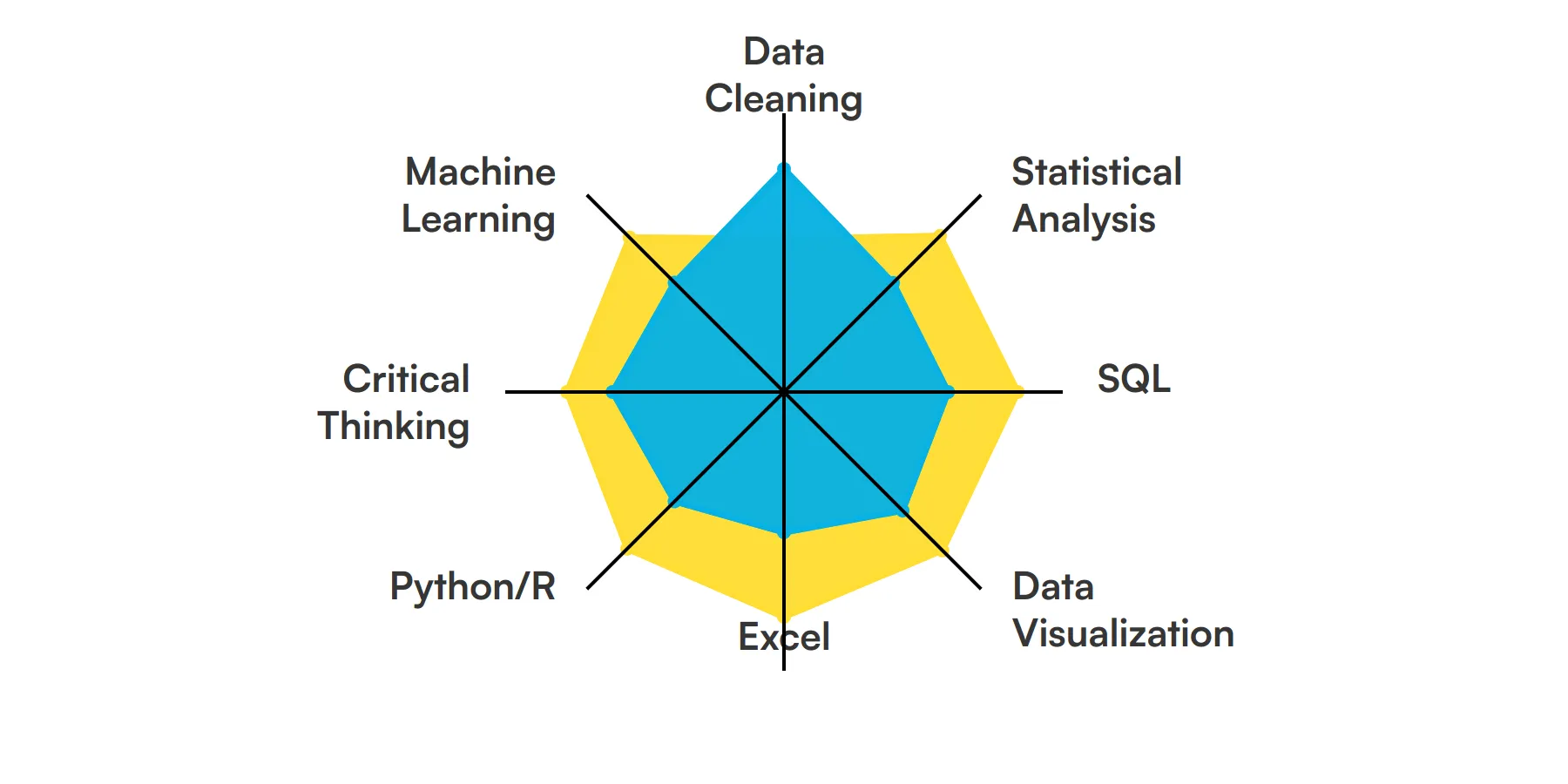
Data Cleaning
Data analysts often deal with raw data that contains errors, missing values, or inconsistencies. Data cleaning involves identifying and correcting these issues to ensure the dataset is accurate and reliable for analysis. This step is crucial for producing valid insights.
Check out our guide for a comprehensive list of interview questions.
Statistical Analysis
Understanding and applying statistical methods is key for a data analyst. This skill helps in interpreting data, identifying trends, and making data-driven decisions. Analysts use statistical tools to test hypotheses and validate the results of their analyses.
SQL
SQL (Structured Query Language) is essential for querying databases. Data analysts use SQL to retrieve, manipulate, and manage data stored in relational databases. Mastery of SQL allows analysts to efficiently access and analyze large datasets.
For more insights, check out our guide to writing a SQL Developer Job Description.
Data Visualization
Data visualization involves creating graphical representations of data to communicate findings clearly and effectively. Tools like Tableau, Power BI, and matplotlib help data analysts present complex data in an understandable format, aiding in decision-making processes.
Excel
Excel remains a powerful tool for data analysis. Data analysts use Excel for data manipulation, performing calculations, and creating pivot tables. Its versatility makes it a go-to tool for quick and straightforward data analysis tasks.
Check out our guide for a comprehensive list of interview questions.
Python/R
Programming languages like Python and R are widely used in data analysis for their powerful data manipulation and statistical analysis capabilities. Data analysts use these languages to automate tasks, perform complex analyses, and build predictive models.
Critical Thinking
Critical thinking is essential for interpreting data accurately and making informed decisions. Data analysts must evaluate data from multiple angles, question assumptions, and draw logical conclusions based on the evidence presented by the data.
Machine Learning
While not always required, knowledge of machine learning can be a significant asset. Data analysts use machine learning algorithms to build predictive models and uncover patterns in data that are not immediately apparent through traditional analysis methods.
For more insights, check out our guide to writing a Machine Learning Engineer Job Description.
10 secondary Data Analyst skills and traits
The best skills for Data Analysts include Data Warehousing, ETL Processes, Business Acumen, Communication Skills, Domain Knowledge, Project Management, APIs, Big Data Technologies, Version Control and Cloud Computing.
Let’s dive into the details by examining the 10 secondary skills of a Data Analyst.
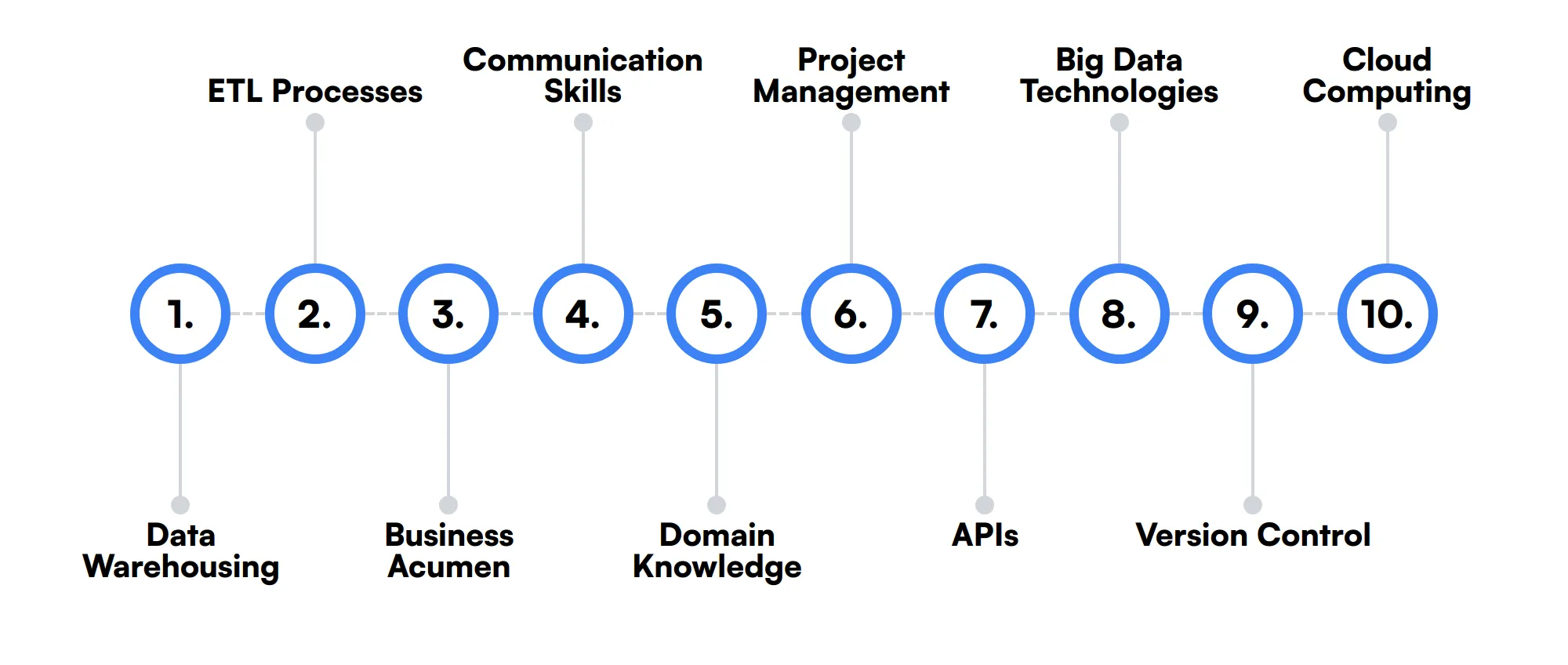
Data Warehousing
Understanding data warehousing concepts helps data analysts manage and retrieve large volumes of data efficiently. Familiarity with tools like Amazon Redshift or Google BigQuery can be beneficial.
ETL Processes
ETL (Extract, Transform, Load) processes are crucial for integrating data from various sources. Data analysts use ETL tools to ensure data is accurately transferred and transformed for analysis.
Business Acumen
Having a good understanding of the business context helps data analysts align their analyses with organizational goals. This skill ensures that the insights generated are relevant and actionable.
Communication Skills
Effective communication is key for data analysts to present their findings to stakeholders. This involves translating complex data insights into clear, actionable recommendations.
Domain Knowledge
Familiarity with the specific industry or domain can enhance a data analyst's ability to interpret data accurately. This knowledge helps in understanding the nuances and context of the data.
Project Management
Project management skills help data analysts manage their workload and meet deadlines. This includes planning, organizing, and overseeing data analysis projects from start to finish.
APIs
Knowledge of APIs (Application Programming Interfaces) allows data analysts to access and integrate data from various online services and platforms, expanding the scope of their analyses.
Big Data Technologies
Familiarity with big data technologies like Hadoop and Spark can be advantageous for handling and analyzing large datasets. These tools enable data analysts to process data at scale.
Version Control
Using version control systems like Git helps data analysts manage changes to their code and collaborate with other team members. This skill is important for maintaining the integrity of analysis scripts and workflows.
Cloud Computing
Knowledge of cloud computing platforms like AWS, Azure, or Google Cloud can be beneficial for data storage, processing, and analysis. These platforms offer scalable solutions for handling large datasets.
How to assess Data Analyst skills and traits
Assessing the skills and traits of a Data Analyst involves more than just glancing at their resume. It's about understanding how well they can handle real-world data challenges, from cleaning data to applying machine learning techniques.
While technical skills like SQL, Python/R, and data visualization are straightforward to list on a CV, soft skills such as critical thinking are harder to quantify. This is where practical assessments come into play, offering a clearer picture of a candidate's true capabilities.
Using tools like Adaface assessments, you can create customized tests that cover a wide range of skills from statistical analysis to machine learning, ensuring a thorough evaluation of each candidate. These assessments are designed to mirror actual job tasks, providing a realistic measure of each applicant's ability to perform on the job. Learn more about Adaface assessments here.
By integrating these assessments into your hiring process, you can achieve a significant reduction in screening time and improve the quality of your hires, ensuring that your new Data Analyst is truly the best fit for your team.
Let’s look at how to assess Data Analyst skills with these 6 talent assessments.
Data Wrangling Test
The Data Wrangling Test evaluates a candidate's skills in cleaning, transforming, and organizing raw data into a structured format suitable for analysis.
The test assesses their understanding of data extraction, parsing, integration, quality assessment, validation, modeling, interpretation, and analysis.
Successful candidates demonstrate proficiency in handling complex datasets, ensuring data quality, and preparing data for insightful analysis.
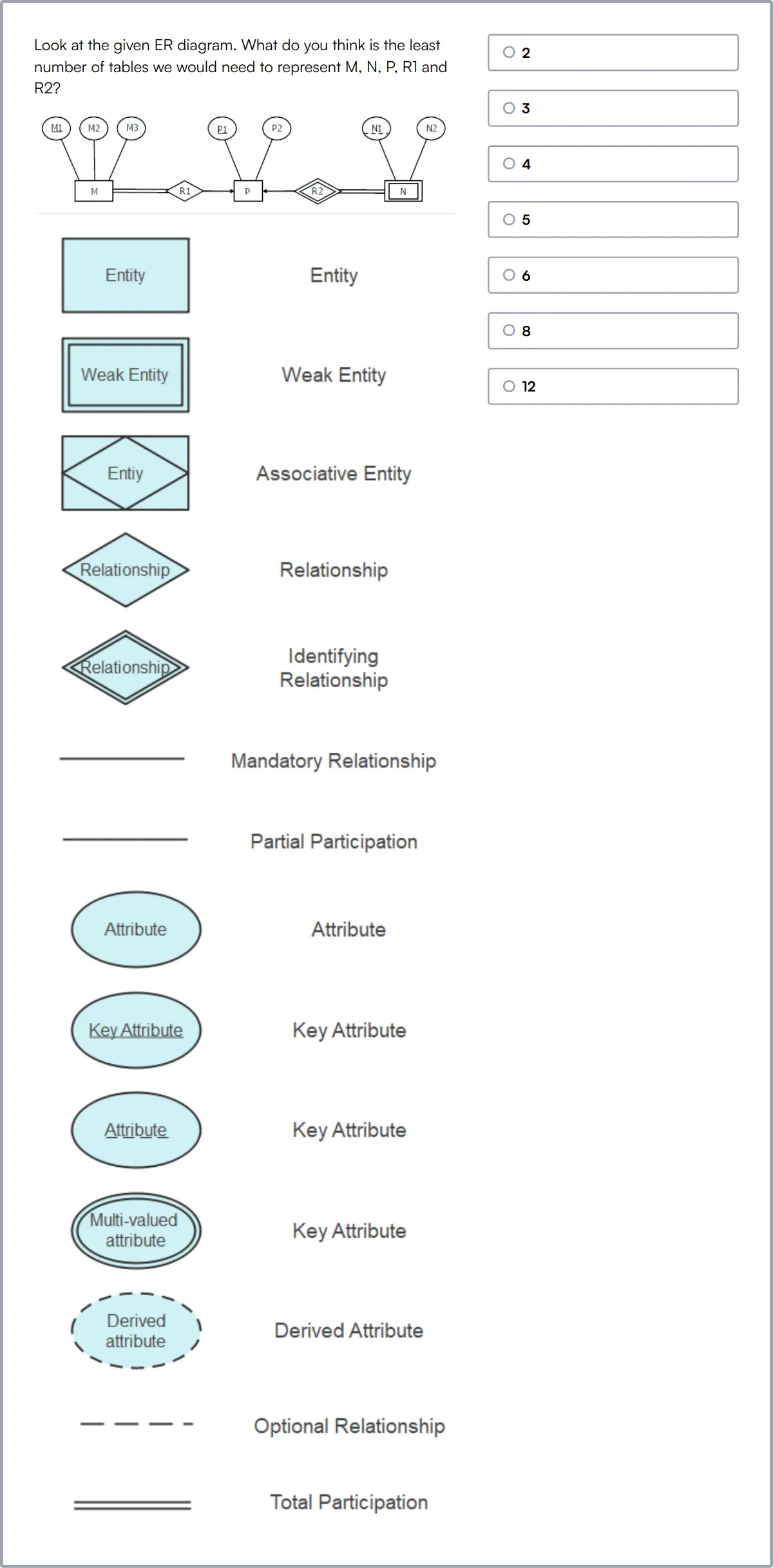
Statistics Test
The Statistics Online Test evaluates a candidate's understanding and proficiency in statistical concepts and analysis.
This test covers statistical methods, data sampling, regression, probability, and exploratory data analysis.
Candidates who excel in this test show strong numerical reasoning and quantitative aptitude, essential for data-driven decision-making.
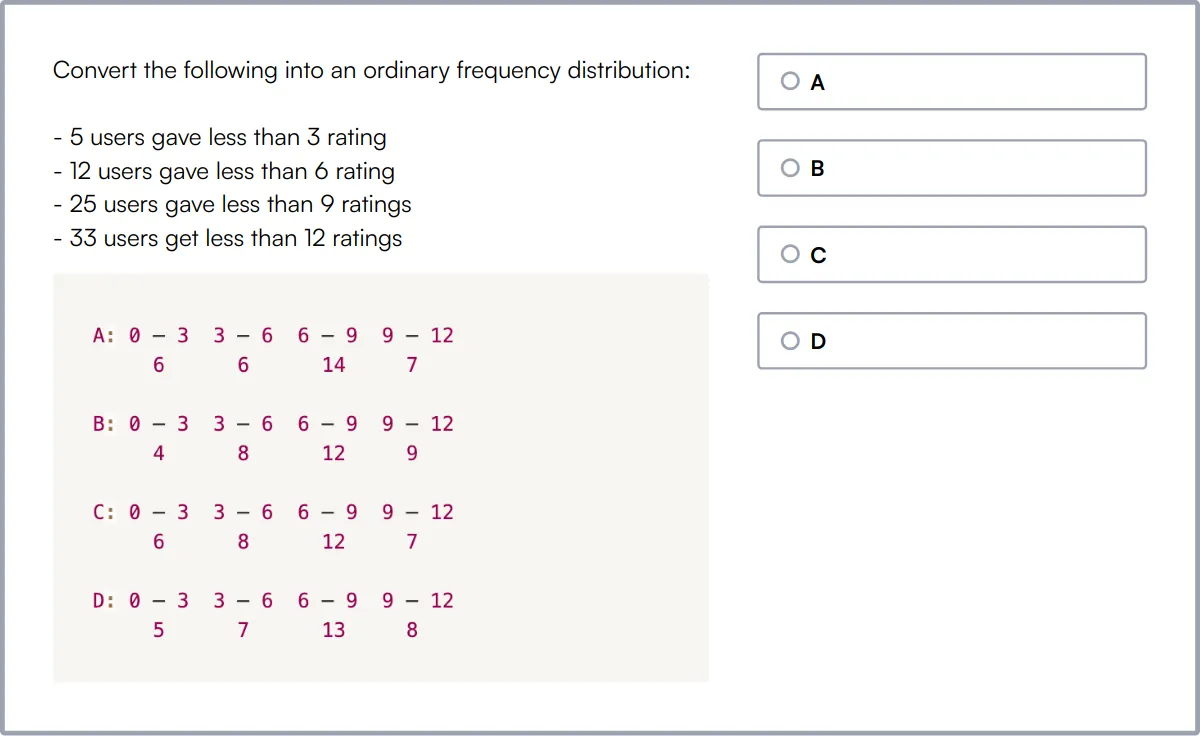
SQL Online Test
The SQL Online Test evaluates a candidate's ability to design and build relational databases and tables from scratch.
The test covers creating databases, CRUD operations, joins, subqueries, and indexing for faster SQL queries.
High-scoring candidates demonstrate a deep understanding of SQL syntax, database management, and query optimization.

Tableau Online Test
The Tableau Online Test evaluates the candidate's ability to connect data from multiple sources into Tableau and create insightful visualizations.
The test covers data cleaning, managing worksheets, sorting and filtering data, creating dashboards, and publishing visualizations.
Candidates who perform well can effectively use Tableau to transform raw data into actionable insights through interactive dashboards.
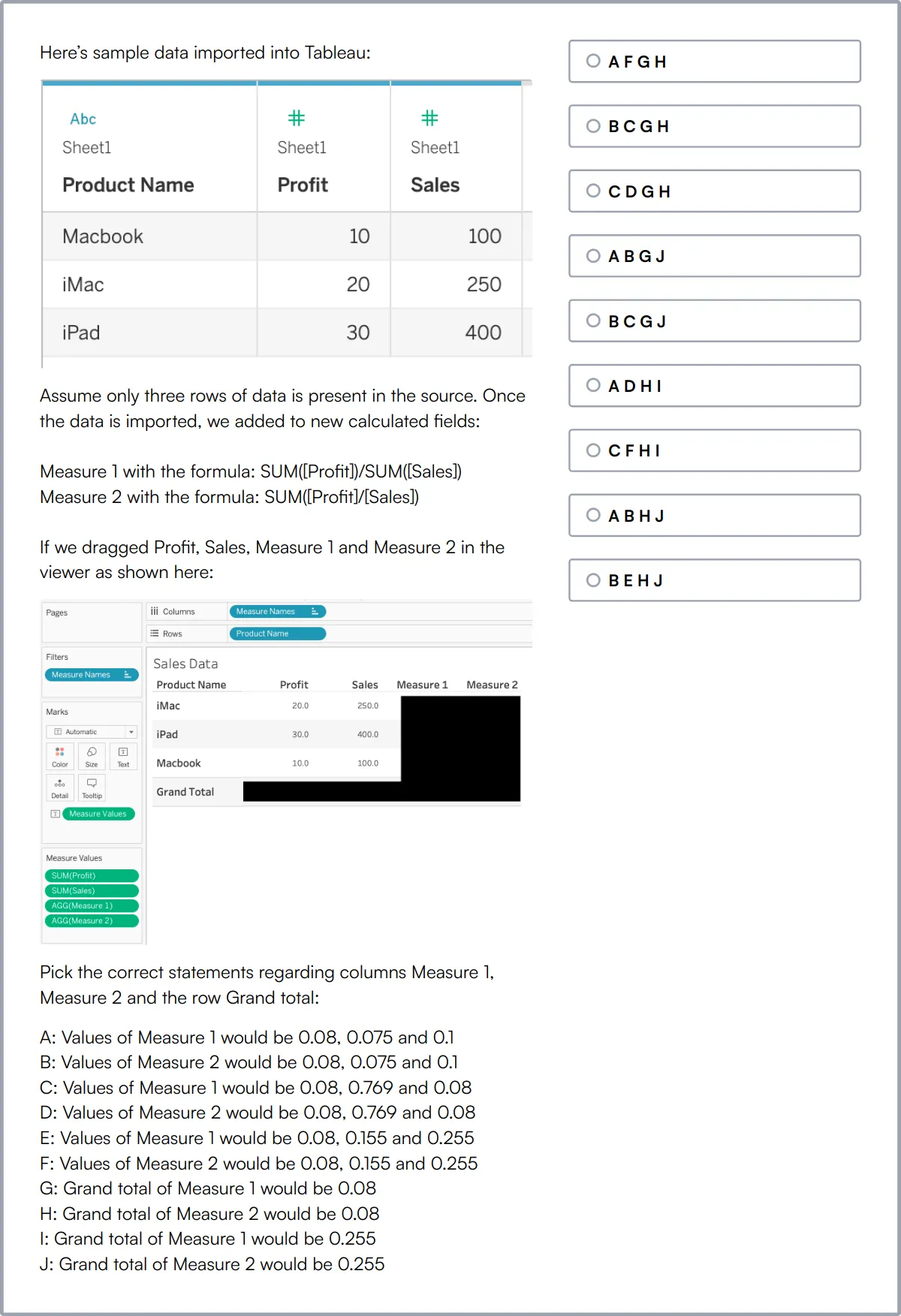
Excel Test
The Excel Test uses scenario-based questions to evaluate a candidate's ability to work with large datasets in Excel.
The test covers basic and advanced formulas, data types, data analysis with PivotTables, and data visualization with charts and graphs.
Successful candidates show proficiency in navigating multiple spreadsheets, using advanced formulas, and creating comprehensive reports.
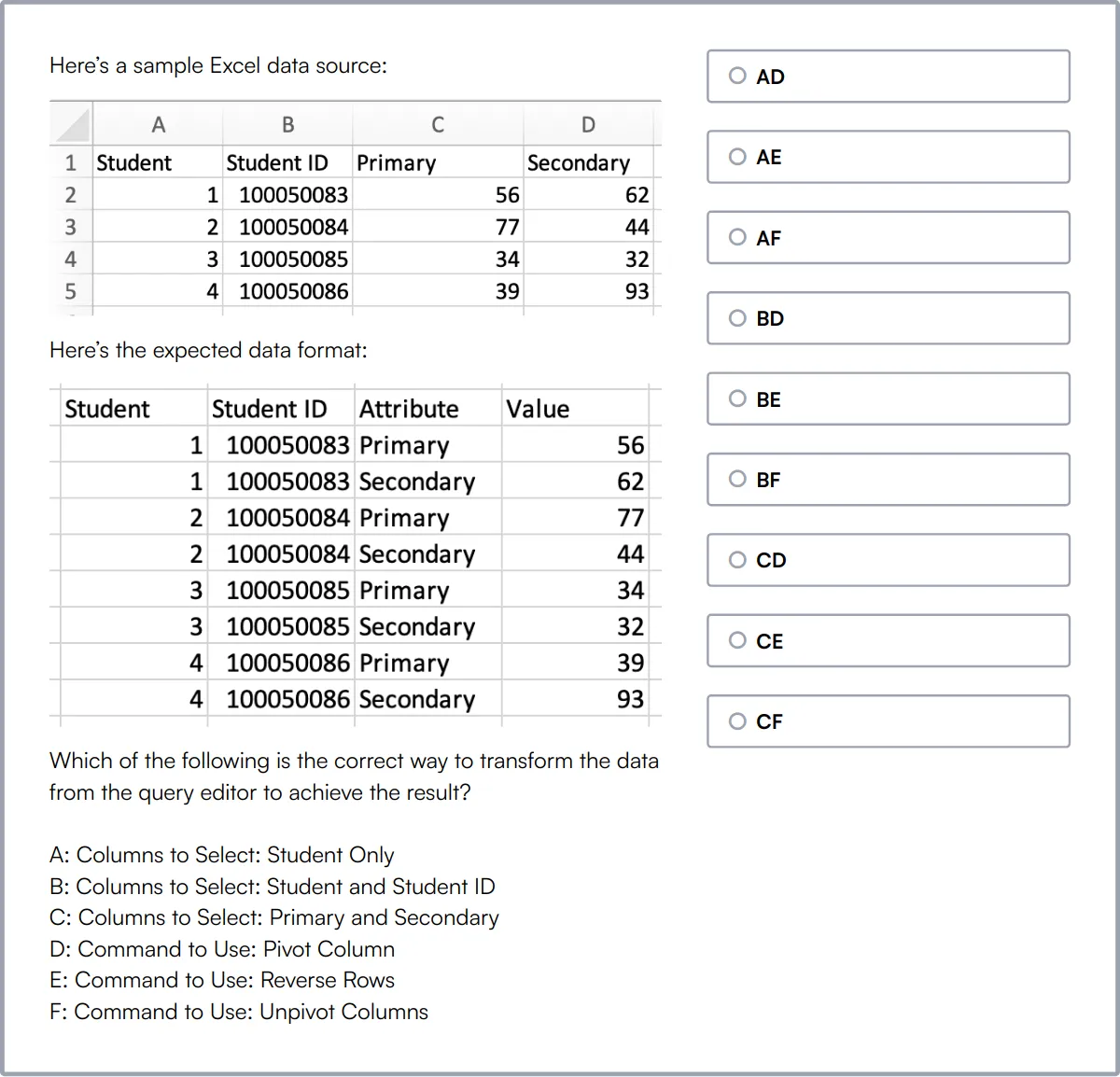
Python Online Test
The Python Online Test evaluates a candidate's ability to use Python data structures and manage files.
The test covers Python fundamentals, data structures, error handling, scripting, web scraping, and OOP principles.
Candidates who excel demonstrate strong coding skills, problem-solving abilities, and a solid understanding of Python's core concepts.
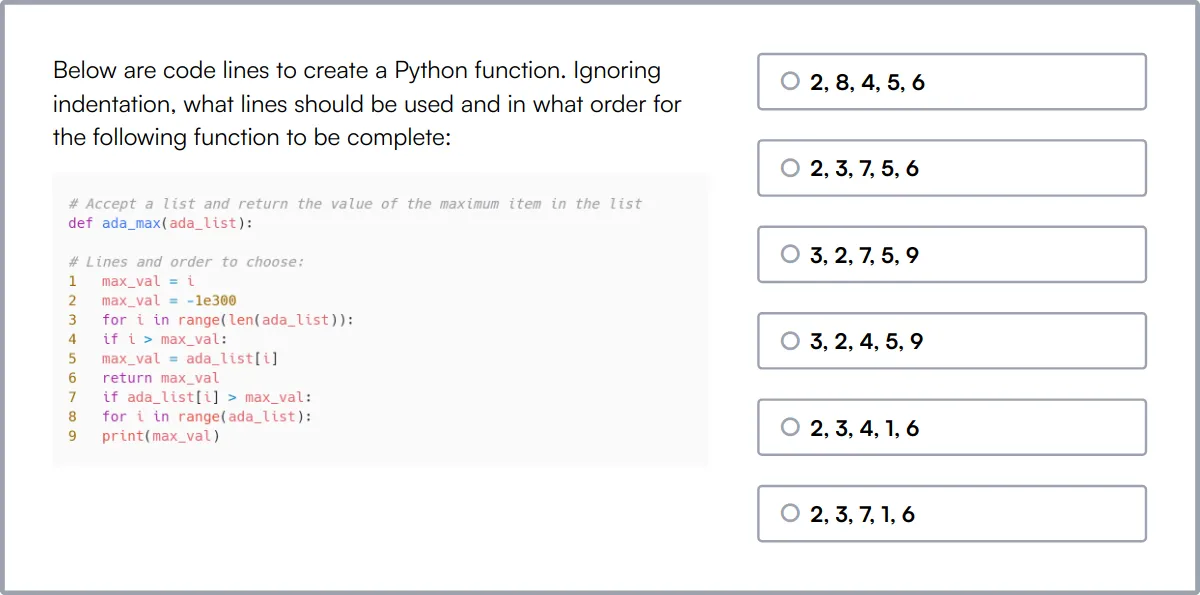
Summary: The 8 key Data Analyst skills and how to test for them
| Data Analyst skill | How to assess them |
|---|---|
| 1. Data Cleaning | Evaluate ability to identify and correct inaccuracies in datasets. |
| 2. Statistical Analysis | Assess proficiency in applying statistical methods to interpret data. |
| 3. SQL | Measure skill in querying and managing relational databases. |
| 4. Data Visualization | Check capability to create clear and informative visual representations of data. |
| 5. Excel | Gauge expertise in using Excel for data manipulation and analysis. |
| 6. Python/R | Evaluate proficiency in using programming languages for data analysis. |
| 7. Critical Thinking | Assess ability to analyze problems and make data-driven decisions. |
| 8. Machine Learning | Measure knowledge in building and applying predictive models. |
Data Analytics in AWS Online Test
Data Analyst skills FAQs
What are the key skills needed for a Data Analyst?
Data Analysts require a mix of skills including data cleaning, statistical analysis, SQL, data visualization, and programming in Python or R. They also need soft skills like critical thinking, communication, and business acumen.
How can recruiters assess SQL skills in Data Analyst candidates?
Recruiters can assess SQL skills by providing practical SQL queries to solve real-world data retrieval problems during the interview. Additionally, discussing past projects where SQL was used can provide insights into the candidate's proficiency.
What is the importance of data visualization skills in data analysis?
Data visualization is key for translating complex data into accessible insights through charts, graphs, and dashboards. It helps stakeholders make informed decisions by presenting data in an understandable format.
Why is Python or R important for Data Analysts?
Python and R are powerful programming languages for data analysis due to their extensive libraries and frameworks that support data manipulation, statistical analysis, and machine learning, making them ideal for handling large datasets and complex analyses.
How do ETL processes relate to Data Analyst roles?
ETL (Extract, Transform, Load) processes are crucial for data analysts as they involve extracting data from different sources, transforming it into a usable format, and loading it into a data warehouse for analysis.
What role does project management play in a Data Analyst's job?
Project management skills help Data Analysts plan, execute, and manage projects efficiently, ensuring that data analysis tasks are completed within deadlines and meet the project's objectives.
How can communication skills impact the effectiveness of a Data Analyst?
Strong communication skills enable Data Analysts to clearly convey complex data insights to non-technical stakeholders, ensuring that the data's value is understood and effectively used in decision-making processes.
What should recruiters look for when assessing a candidate's expertise in big data technologies?
Recruiters should look for experience with platforms like Hadoop and Spark, and assess understanding of how to manipulate and analyze large datasets that cannot be handled with traditional data processing software.

40 min skill tests.
No trick questions.
Accurate shortlisting.
We make it easy for you to find the best candidates in your pipeline with a 40 min skills test.
Try for freeRelated posts
Free resources



